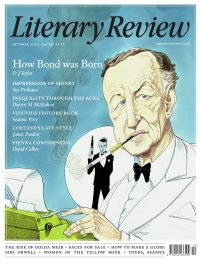Norma Clarke
The Allure of the Everyday
The Upside-Down World: Meetings with the Dutch Masters
By Benjamin Moser
Allen Lane 362pp £30
A love affair took Benjamin Moser from New York to the Netherlands twenty years ago. He was twenty-six and an aspiring writer. Two well-received books followed: a biography of Clarice Lispector and Sontag: Her Life, which won the Pulitzer Prize. All the while he sought to understand the country he had made his home, which was inevitably remaking him, and he did so mostly by learning about Dutch Golden Age artists, whose paintings, gathered in the country’s many museums, had a powerful effect.
A museum, he writes, has an aura. It promises improvement, elevation. Walking through galleries of Dutch art was at once calming and exciting; it raised questions, stimulated curiosity, the quantity as well as quality of the art astonishing him. How did such a small country achieve so much? Having come from a very big country, Moser felt his foreignness; it was as if the world had been turned upside down and he was viewing things the wrong way up. He cites a scene in Netherlandish Proverbs by Pieter Bruegel the Elder. A little globe is turned upside down and a man is shitting on it from an upstairs window. The scene is a reference to the Dutch expression ‘the upside-down world’. It is, says Moser, ‘a concise symbol for what happens when you become a foreigner. You stand on some other portion of the globe. What was up is suddenly down.’ Moser was ignorant when he arrived in the Netherlands. His recognition of his ignorance, and excitement at what he’s found out, along with the desire to know more, lends a particular aura to this book.
The Upside-Down World is structured as a sequence of linked essays, or ‘meetings’. There are eighteen chapters, each dedicated to a particular artist, beginning with Rembrandt and ending with Adriaen Coorte; all are men, except for Rachel Ruysch. Each chapter is richly illustrated. The writing is conversational yet erudite, threaded

Sign Up to our newsletter
Receive free articles, highlights from the archive, news, details of prizes, and much more.@Lit_Review
Follow Literary Review on Twitter
Twitter Feed
Though Jean-Michel Basquiat was a sensation in his lifetime, it was thirty years after his death that one of his pieces fetched a record price of $110.5 million.
Stephen Smith explores the artist's starry afterlife.
Stephen Smith - Paint Fast, Die Young
Stephen Smith: Paint Fast, Die Young - Jean-Michel Basquiat: The Making of an Icon by Doug Woodham
literaryreview.co.uk
15th-century news transmission was a slow business, reliant on horses and ships. As the centuries passed, though, mass newspapers and faster transport sped things up.
John Adamson examines how this evolution changed Europe.
John Adamson - Hold the Front Page
John Adamson: Hold the Front Page - The Great Exchange: Making the News in Early Modern Europe by Joad Raymond Wren
literaryreview.co.uk
"Every page of "Killing the Dead" bursts with fresh insights and deliciously gory details. And, like all the best vampires, it’ll come back to haunt you long after you think you’re done."
✍️My review of John Blair's new book for @Lit_Review
Alexander Lee - Dead Men Walking
Alexander Lee: Dead Men Walking - Killing the Dead: Vampire Epidemics from Mesopotamia to the New World by John Blair
literaryreview.co.uk